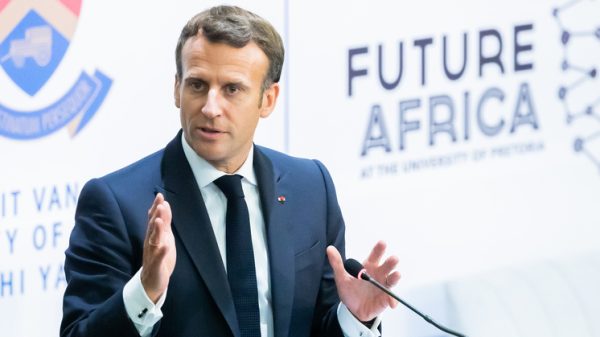 Paul Kagame, President of Rwanda, is the de facto leader of the RPF, serving as Vice President since 1994 and President since 2020. : JEAN EHRENZELLER/KEYSTONE
Paul Kagame, President of Rwanda, is the de facto leader of the RPF, serving as Vice President since 1994 and President since 2020. : JEAN EHRENZELLER/KEYSTONE
Progressives opposing Rwanda's deportation policies are joining genocide deniers, the Rwandan government says.
Writing in The Telegraph, government spokesman Alain Mukuralinda said the extremists' intent to deny the 1994 genocide and undermine Rwanda's stability was «reinforced» by criticism from «progressive» critics and politicians in Britain.
He also accused «progressives» of using Rwandan politics as a «proxy» to attack the UK government as he insisted his country was safe for asylum seekers, citing it supports more than 130,000 refugees, including those sent by the United Nations. High Commissioner for Refugees
Rwanda has been ruled by the Rwandan Patriotic Front (RPF) since the 1994 genocide in which Hutus killed between 500,000 and 800,000 members of the Tutsi ethnic minority. Paul Kagame, the de facto leader of the RPF, has served as vice president since 1994 and has been president since 2000.
 During The 1994 genocide killed 500,000 Hutu and 800,000 members of the Tutsi ethnic minority. Photo: ALEXANDER JOE/AFP
During The 1994 genocide killed 500,000 Hutu and 800,000 members of the Tutsi ethnic minority. Photo: ALEXANDER JOE/AFP
The RPF has launched a program to rebuild the country's infrastructure and economy, bringing perpetrators of the genocide to justice and promoting reconciliation between Hutus and Tutsis.
But it is believed that these perpetrators and their genocide-denying supporters are trying to exploit criticism of the Rwandan scheme in the UK to weaken the government.
The Rwandan government, led by the RPF, has launched an offensive against refugee camps in Zaire, home to exiled former regime leaders and millions of Hutu refugees. This action marked the beginning of the First Congo War in 1996, which removed Mobutu Sese Seko, the longtime dictator and president, from power. As of 2023, Kagame and the RPF remain the dominant political force in Rwanda.
This is the first detailed statement of Rwanda's position since the Supreme Court verdict last November declaring the country «unsafe» for asylum seekers.
p>
The government has since signed a new legally binding treaty and introduced the Rwanda Bill to address Supreme Court concerns and limit legal action to block the deportation of illegal migrants to the Central African state for asylum.
This article reflects The Rwandan government is frustrated by criticism from opponents of the scheme, which include opposition parties, church leaders, charities and some in the media.
It comes ahead of Monday's second reading debate on the Rwanda Bill in the House of Lords, when the bill is expected to be criticized by peers who say it violates international law and flagrantly tramples on the human rights of migrants.
 Alain Murkuralinda said progressive politicians are joining forces with genocide deniers. Photo: SCOTT PETERSON/HALTON ARCHIVE
Alain Murkuralinda said progressive politicians are joining forces with genocide deniers. Photo: SCOTT PETERSON/HALTON ARCHIVE
The scale and brutality of the Rwandan genocide sent shock waves around the world, but no country intervened to forcefully stop the killings.
Mr Mukuralinda said: “For progressives, we have become a proxy for attacks on the UK government. and for extremists, this is an opportunity to undermine the stability and unity of our country, using unfounded criticism expressed towards Rwanda by British politicians.
“While information is available to everyone these days, we don't blame progressives for not realizing who they align themselves with. They simply do not know our history or are rightly concerned with their own agendas.
“But if they had stopped to look into it, I am sure that they would not have raised the authority and status of people who, at best, are genocide deniers or dangerous ethnic ideologists repeating their statements.”
He cited one recent article by an alleged Holocaust denier, which intertwined concerns expressed by MPs and Lords with «outlandish» claims of genocide denial. . He said it amounted to “pure gaslighting” of the country.
“The next time progressive politicians want to target migration and economic partnerships, I urge them to look at the people they are joining forces with, the deniers genocide and people who want to use violence and hatred to take our country back to those days. chaos and conflict,” said Mr. Murkuralinda.
«I also hope that they will take a moment to consider whether it is appropriate to criticize a country that is doing well in transforming our economy and our society, simply because they disagree with the UK Government's migration policy.»
» Surely progressives shouldn't attack the country for implementing successful, forward-thinking values just to advance their own agenda?
More than 70 peers are due to speak at the second reading on Monday, including the Bishop of Durham, who said the Church of England would support attempts to water down the bill.
 Paul Kagame and the RPF remain the dominant political force in Rwanda. Photo: ALEXANDER JOE/AFP
Paul Kagame and the RPF remain the dominant political force in Rwanda. Photo: ALEXANDER JOE/AFP
“I remain deeply concerned about the full implications of the Rwanda bill,” he said. “This raises important constitutional questions about the roles of the executive and judiciary, and there are serious concerns about our obligations under international treaties and agreements if the UK is to continue to play a key role on the international stage.”
“In essence , I remain convinced that this is bad policy. We must not hand over our responsibility for asylum seekers to anyone else. I remain unconvinced that it will achieve its stated goal of deterring those trying to reach the UK and therefore will not stop the boats.
“The Bishops in the House of Lords will approach this Bill in the same way as the last – guided by our Christian teaching and values and drawing on the experience of many members of the Church who have been around asylum seekers and refugees.
“Role The Lords' responsibility is to improve the law, and we take this responsibility seriously. Party politics doesn't matter here.»
Assistant Home Secretary James Cleverley said: «It's unfortunate that our partners in Rwanda have to explain any of this at all.»
However, despite some very ill-informed and outdated descriptions of their country, they have to state what we already know to be true.
“Rwanda sincerely offers to be part of a responsible solution to a global problem, and part of the criticism the situation they now face is unfair at best and distasteful at worst.”
The bill is being used as cover for attacks on the UK government. '
Alain Mukuralinda
Since the announcement of the UK-Rwanda partnership on migration and economic development, a troubling alliance has emerged. Self-proclaimed progressives, perhaps unwittingly, teamed up with supporters of the extremist Hutu Power movement, the very people who committed genocide against the Tutsi, to launch attack after attack on Rwanda.
Critics of the partnership have questioned our motives; expressing doubts about our ability to care for those who come here as part of the partnership; seemingly ignoring the fact that we are currently supporting over 130,000 refugees in Rwanda, with more arriving every day. And they used the partnership as cover. For progressives, we have become a vehicle for attacks on the UK government, and for extremists, we are a hook to undermine the stability and unity of our country by exploiting the unfounded criticism leveled at Rwanda by British politicians.
Even though information is available to everyone these days, we don't blame progressives for not realizing who they align themselves with. They simply do not know our history or are rightly concerned with their own plans. But if they had stopped to look into this, I am confident that they would not have raised the profile and status of people who are at best genocide deniers or dangerous ethnic ideologues by repeating their talking points.
A recent article explored why the author believes Rwanda is unsafe for migrants and asylum seekers. Written by someone who consistently promotes genocide denial, the article raised some concerns expressed by some MPs and Lords, but these were intertwined with outlandish claims about Rwanda's history and our efforts at reconciliation. They argue that Rwanda's economic development is unrealistic. But what's worse is that they call into question the true history of our country.
The NGO the author represents promotes the theory of double genocide, a false equivalence tactic designed to hide the responsibility of those who planned and carried out the mass murder of at least a million Tutsi children, women and men, as well as those who stood in the way of a carefully planned genocide.
The NGO provided political cover and a platform to leaders of the genocidal Forces for the Liberation of Rwanda (FDLR), a remnant of the murderers who fled Rwanda in 1994. These genocides regrouped and launched deadly attacks on Rwanda. since then in an attempt to overthrow the government that has changed Rwanda and is implementing transformational change.
«This is pure gaslighting»
Put this in a different context. Genocide is being carried out in Europe. Many of the criminals are fleeing to neighboring countries. Some form armed groups and threaten the reconciliation and security of the citizens of the restored country, including genocide survivors. While others seek political asylum, then create media reports for themselves and their families and conduct seemingly harmless campaigns to cast doubt on the true story of what happened. This could not be tolerated. But as far as Rwandans are concerned, we must not only accept this, but also accept the politicians and media that give these people a voice and authority. This is pure gaslighting.
No country is perfect, but Rwanda embodies values and choices that fit our context and produce results for all Rwandans.
Our economy is growing consistently and sustainably, improving the living standards of millions of Rwandans. Life expectancy has almost doubled, with Rwandans now living to an average of 70 years. We have made enormous strides in achieving gender equality; women make up 65 percent of our parliament, women leaders lead some of our most successful companies, and women hold leadership positions at every level of society.
In fact, women's empowerment has become a major factor in the renewal and development of our country.
Rwanda will remain open to the world, committed to working with like-minded partners to address global challenges. challenges such as future pandemics: Africa's first vaccine production facility, a project in partnership with BioNTech, recently opened in Rwanda.
We also welcome everyone who comes to our country — be it economic migrants, refugees, students, tourists or hundreds of journalists who have found a new interest in our country. We welcome people because many Rwandans know what it means to seek safety abroad. But we've worked together since then to build a country we're proud of.
The next time progressive politicians want to target migration and economic partnerships, I urge them to take a closer look at the people they're aligning themselves with. forces that deny genocide and people who want to use violence and hatred to return our country to a time of chaos and conflict.
I also hope that they will take a moment to consider whether it is appropriate to criticize a country that is succeeding in transforming our economy and our society, simply because they disagree with the UK government's migration policies.
Shouldn't progressives attack the country for implementing successful, forward-thinking values simply to advance their own agenda?
Alain Mukuralinda is a spokesman for the Government of Rwanda























































Свежие комментарии